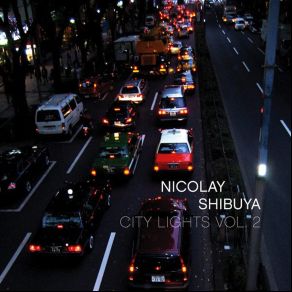City Lights, Vol. 2: Shibuya
Download links and information about City Lights, Vol. 2: Shibuya by Nicolay. This album was released in 2009 and it belongs to Downtempo, Electronica genres. It contains 15 tracks with total duration of 45:09 minutes.

|
|
|---|---|
| Artist: | Nicolay |
| Release date: | 2009 |
| Genre: | Downtempo, Electronica |
| Tracks: | 15 |
| Duration: | 45:09 |
| Buy it NOW at: | |
| Buy on iTunes $9.99 | |
Tracks
[Edit]| No. | Title | Length |
|---|---|---|
| 1. | Lose Your Way (feat. Carlitta Durand) | 4:46 |
| 2. | Shibuya Station | 3:22 |
| 3. | Crossing | 2:10 |
| 4. | Rain In Ueno Park | 2:50 |
| 5. | Satellite | 2:41 |
| 6. | Saturday Night (feat. Carlitta Durand) | 6:02 |
| 7. | A Ride Under the Neon Moon | 0:45 |
| 8. | Omotesando | 3:07 |
| 9. | Meiji Shrine | 3:21 |
| 10. | Shadow Dancing | 2:54 |
| 11. | The Inner Garden | 2:32 |
| 12. | Bullet Train | 3:02 |
| 13. | Wake Up In Another Life (feat. Carlitta Durand) | 3:46 |
| 14. | Departure | 2:21 |
| 15. | Shibuya Epilogue (feat. Carlitta Durand) | 1:30 |
Details
[Edit]The second volume of Nicolay's City Lights series is a travelogue that, through the eyes of an amazed and slightly dazed visitor, reflects the character of Tokyo's Shibuya ward — getting lost in its nightlife, basking in its spirituality, and several points in-between. In the wake of the producer's work on the Foreign Exchange's Leave It All Behind, a lack of progression would have been excusable, but Nicolay manages (remarkably enough) to expand his range both stylistically and conceptually. Mostly instrumental, Nicolay plays everything with the exception of a couple piano solos (provided by Zo!), while FE partner Phonte wrote and arranged for the four songs with vocals, all of which feature Carlitta Durand's whispery, sweetly uplifting voice. Faultlessly sequenced, just about every track is a set-up for what follows, and though the whole set is bathed in a unifying luster, the shifts in sound are not insignificant. Ranging beyond Nicolay's past output, Shibuya delves deeper into the boundless energy and complexities of late-'70s jazz fusion, steps into lush deep house, and otherwise moves smoothly on mellow downtempo pieces that are too stimulating to be regarded as mere mood music. What puts it over the top is not necessarily its central track or overall highlight but its two biggest surprises: the crisp, sleek, and discreetly dubby "Saturday Night," a four/four-rooted club track that could be a soundclash with the Force Tracks label circa Hypercity, and the beaming and almost frantic "Wake Up in Another Life," a dead ringer for an imagined West London broken beat interpretation of late-'70s George Duke (like "Yeah, We Going" or "Up from the Sea It Arose"). Nicolay's sense of wonderment shines through all of this, another unassuming gem from one of the most creative and increasingly chameleonic producers around.